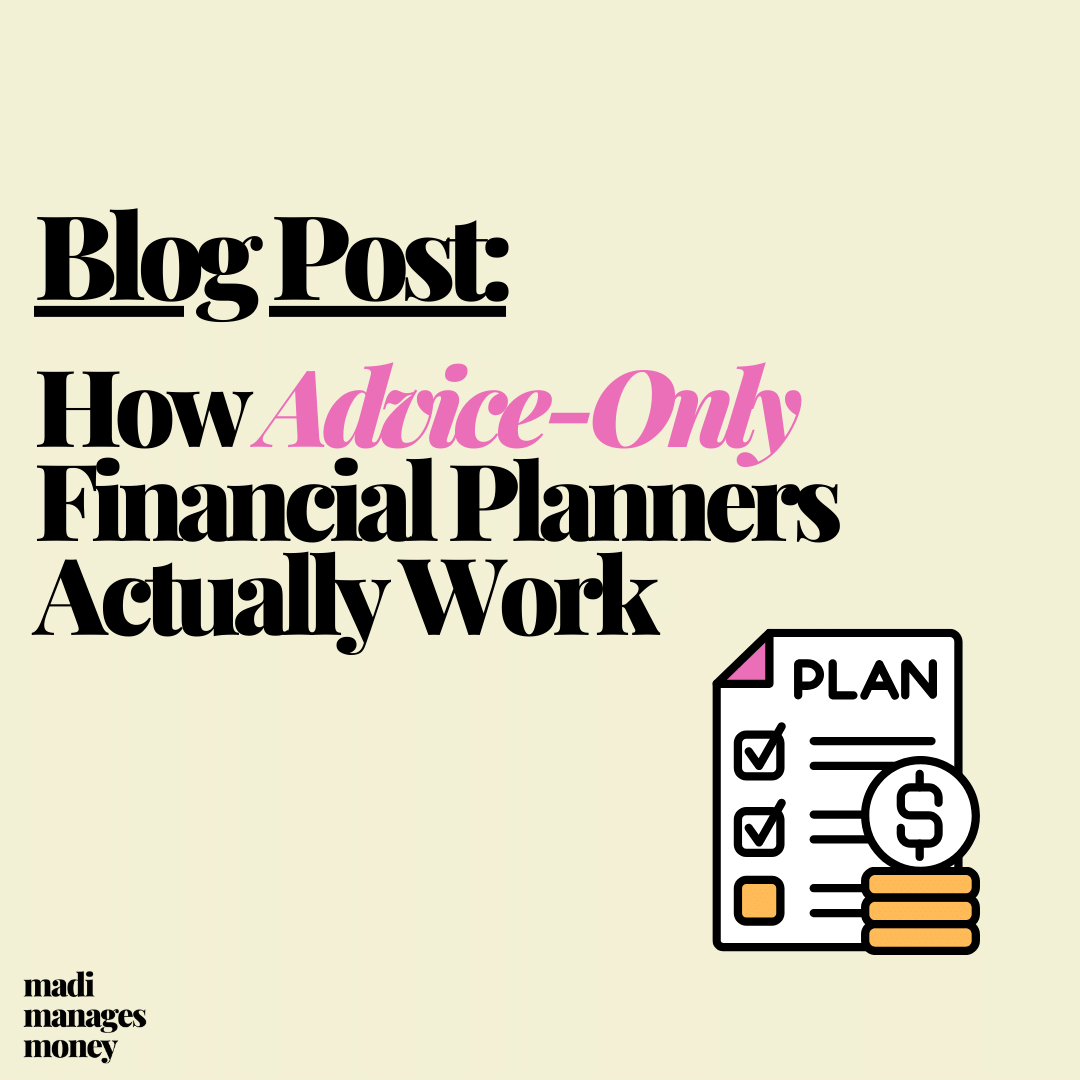When I started working with a copywriter for my website, I repeatedly stressed to her with great pride (like the dork I am) that I was an advice-only financial planner.
Eventually, she delicately broke the hard news to me. Does anyone even know what that means?, she asked.
A few months into running my business, I’ve realized she was right. No, no one knows what advice-only financial planning is and how it works.
It’s no wonder. With the alphabet soup of designations (CFA, CFP, CPA) and a smorgasbord of types of advice out there (broker, fiduciary, planner), it’s downright confusing for advice-seekers.
Simply put, an advice-only financial planner is someone who gives you financial advice without touching your money. Now, if this sounds like sorcery to you, keep reading.
This blog post explains how it works and why it’s an ideal (but lesser known) way to get financial advice if you’re someone who likes to be involved in your finances.
How do advice-only financial planners manage your money?
Advice-only financial planners provide financial advice on your assets wherever they’re located. Even though most of us refer to ourselves as financial planners, what we’re really delivering is financial planning and investment management.
Do you have a Roth IRA at Vanguard that you love? Good! Keep it there. I’ll advise you on how much to put into that account and what to invest in right where it’s at. There’s no need to move the account to me (which is a burden and a commitment) to get sound advice.
Have virtually all of your investments stored in your 401(k)? Even better. I’ll give you advice on how to position your investments inside. I’ll also make sure you’re taking full advantage of every last drop of 401(k) benefit offered to you by your employer.
You can be sure, though, that if I see your money’s somewhere that’s not in your best interest, I’ll let you know. Then, I’ll help you get it to the right place.
Our investment recommendations are usually streamlined with low-cost index funds.
Advice-only financial planners tend to keep our investment portfolios and recommendations straightforward. In practice, this usually looks like a mixture of just a few passive, low-cost index funds.
Simplicity serves a dual purpose: Our clients walk away with low-maintenance investment portfolios that are also backed by academic research.
Unfortunately, traditional financial advisors who charge a percentage of your assets often feel compelled to justify their investment fee. This usually manifests in overly complex portfolios with too many holdings, tilts, trading, and active managers. All of these things translate to higher costs for clients.
When it comes to implementation, advice-only financial planners aren’t leaving you to the wolves. Generally, we set up your investment accounts together in a virtual meeting.
How do advice-only financial planners charge?
Advice-only planners never charge commissions, and we don’t charge based on assets under management. Most of us charge flat, upfront fees instead. Pricing transparency sits at our core.
Since we aren’t charging on asset we manage, we don’t impose investment minimums to work together. For folks who don’t have mega assets outside of their work retirement plans, which is most of us in our 30s and 40s. This has been a longstanding barrier to seeking advice, but not anymore. Getting clear guidance when you’re earlier in your financial trajectory makes all the difference.
Here’s a transparent look at my own pricing. My Starter level financial plans, which are for younger couples and families just crossing the $1,000,000 threshold, are priced at a flat fee of $2,500. My more complex Comprehensive offering is $8,500.
My upfront fees might seem steep at first glance., but when you compare them to the standard advisor’s AUM fee of 1% (if not higher), the year-after-year cost savings quickly adds up. That’s especially true if your financial advisor isn’t doing in-depth financial planning and is really just charging their fee for investment management. (This is super common.) If that’s all you need, you’re better off hiring a robo-advisor at a much lower cost.
Advice-only financial planning is the most objective form of financial advice, bar none.
Since advice-only financial planners have no incentive to pressure clients to move your assets to us, it eliminates several conflicts of interest.
Most advice-seekers have been conditioned, and rightfully so, to regard advisors who charge commissions with skepticism. But there are also conflicts of interest that sprawl beyond this that often go unnoticed.
Retirement plan rollovers and paying off debt are two of them.
Rollovers
For high-earning clients & prospects, one of the most common “mistakes” I see their previous financial advisor make is around rollovers. Advisors who charge AUM fees are incentivized to gather your assets and hold on for dear life. This is true even when they are fee-only fiduciaries.
This leads to over recommending rollovers *from* previous employer retirement plans into an IRA (that their firm conveniently manages). Conversely, they’re incentivized to under recommend rolling retirement assets *into* your current employer’s plan.
If you earn above the income limits to make direct contributions to a Roth IRA, that advisor has placed a tax roadblock in your way. When you have pre-tax assets sitting in a Traditional IRA, doing backdoor Roth IRA contributions will trigger taxes.
A common workaround for this is keeping your pre-tax retirement money in an employer plan, like your 401(k). This, however, would require that advisor to relinquish money they’re managing and charging on.
Paying off debt
Let’s pretend you have a mortgage with a 5.5% interest rate, and you’ve already done a great job of saving for retirement. You’re ahead of schedule.
Perhaps you’re in your 40s and investing in a 70% stock and 30% bond mixture. The amount you’ll earn on your investments is likely to be pretty close to the interest rate you’re paying. In this situation, it’s unclear whether paying off the mortgage or investing in the market will yield higher results.
You express to your AUM advisor an almost primal desire to be debt free, and only that blasted mortgage stands in your way. Every time you bring up your wish to pay it off, it feels like your advisor is hellbent on dissuading you.
Well, that might be because the more money you put toward your mortgage, the less money there is for them to manage.
When to *not* hire an advice-only financial planner
If you’re someone who wants to completely outsource your finances, an advice-only financial planner probably isn’t for you.
There’s an element of logging into your accounts to implement advice and gathering financial info to give to your planner. If this exceeds your DIY capabilities, go with an advisor who’s going to charge you based on AUM. If they’re doing in-depth financial planning for you and taking everything off your plate, they’re probably worth the ongoing fee!
Also, if you’re looking for someone to only manage your investment portfolios and hoping to outperform the market, you’re probably barking up the wrong tree. For professional investment management at a low cost, I’d hire a robo-advisor or purchase a target date fund and be done with it. As for the outperforming part, I wish you all the luck in the world.
Advice-only financial planners are the advice model of the future.
You know the alarmist scientist who’s running around at the beginning of every Armageddon-esque movie? The one nobody listens to until it’s too late? Among the lot of financial advisors, the advice-only financial planners are that dude.
(Disregard the cliché where they’re dropping papers, eating Cheetos, and are generally disheveled.)
Among other financial professionals, we’re regarded as nonconformists with a streak of righteousness. If you ask me, I think we’re just ahead of the curve.
The opinions voiced in this material are for general information only and are not intended to provide specific advice or recommendations for any individual. To determine which investments may be appropriate for you, consult with your financial advisor.

